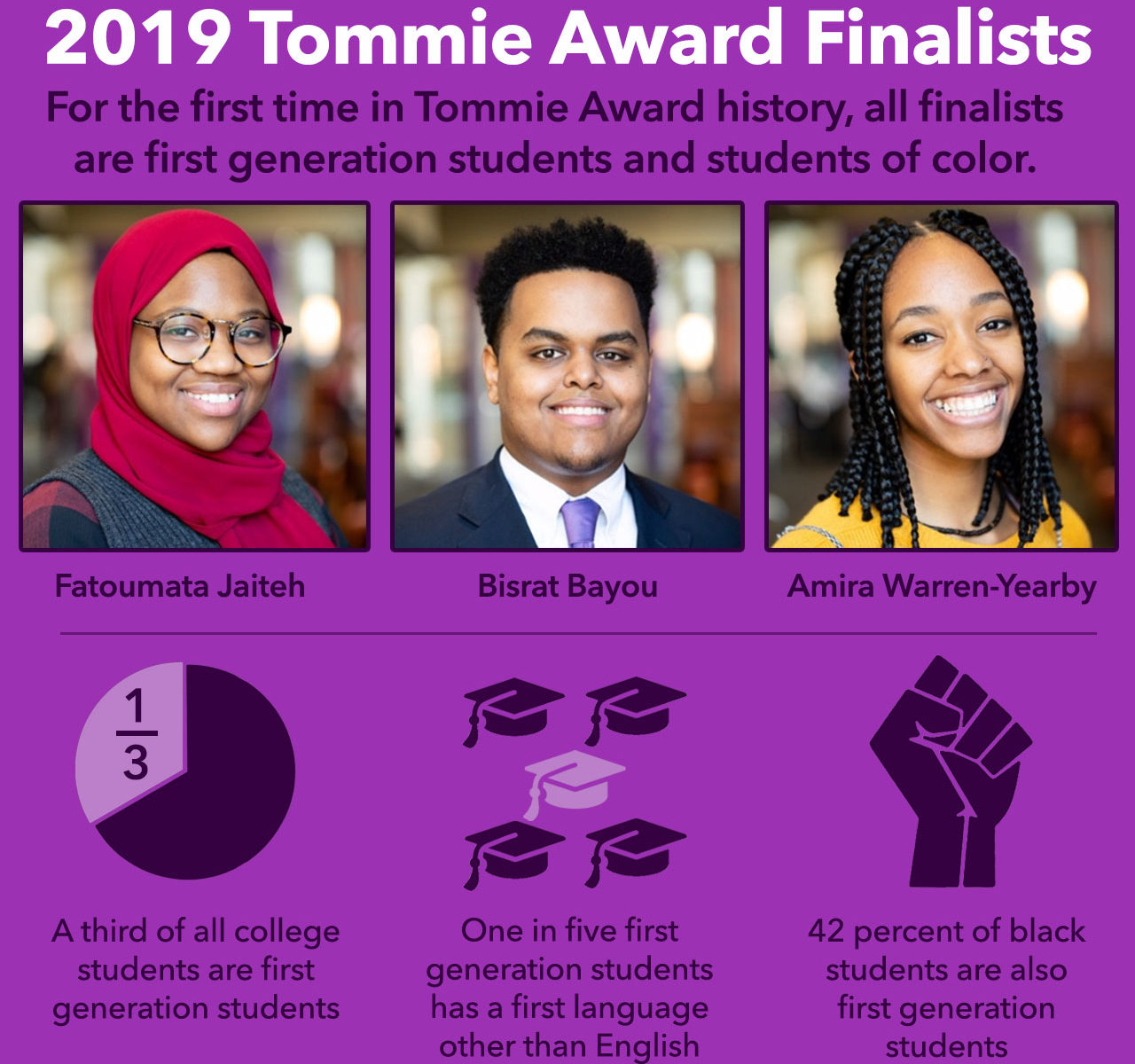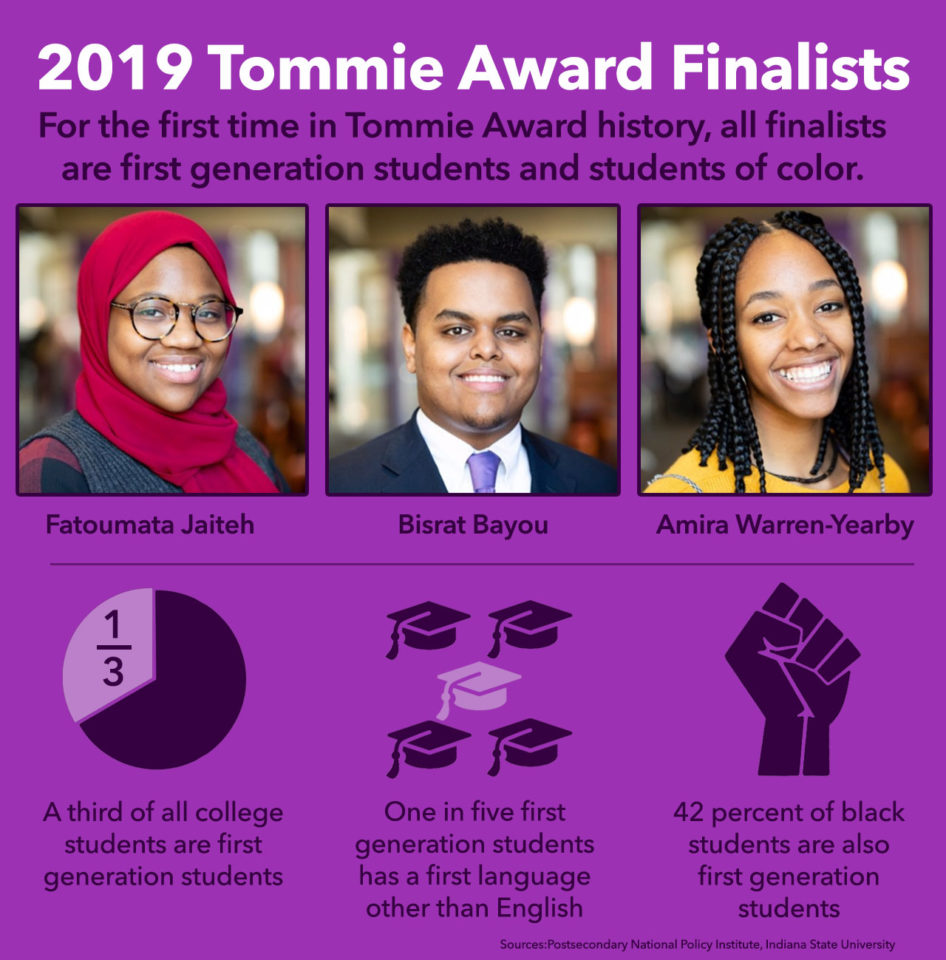Each year, three seniors at St. Thomas are named finalists for the Tommie Award – an award given out to the student who, according to the university, “best represents the ideals of St. Thomas Aquinas” as determined by a campus wide vote. This year marked the first time in the history of the award where all three finalists were first generation college students and students of color.
The three candidates started a friendship as incoming first-year students during St. Thomas’s REAL program, but over the next four years Bisrat Bayou, Fatoumata Jaiteh and Amira Warren-Yearby were led down different paths to self-discovery, finding unique inner motivations to revolutionize their school.
“We had no idea what we were getting into here at St. Thomas,” said Bayou, the eventual winner of this year’s Tommie Award.
Bisrat Bayou
Over a year ago, then-junior resident adviser Bisrat Bayou saw the N-word etched over his ‘about me’ bulletin board in Ireland Hall. The year prior he had seen the same word written on the concrete near his living space when he was walking home with friends. He said the second time made him feel even worse because the slur was etched over a sign indicating his hometown –something that was a part of him.
“Freshman year I definitely wasn’t the person I am today. I was very much filled with doubt in who I was,” Bayou said.
The lack of having a role model or a mentor while he was growing up made him apprehensive about his future, Bayou said.
With or without a preset example, in the face of a second instance of racial prejudice while at St. Thomas, Bayou decided to fight.
“It just made me kind of hungry. I was hungry to get the work done and put this university on its toes,” Bayou said.
Now, Bayou looks to be the influence he never had for the younger generation, specifically aspiring first-generation college students. He is starting with his two younger brothers, who are 11 and 13 years old.
He has been involved in mentorship programs throughout his time at St. Thomas, but he especially wants to be a role model for young students of color at a time they might feel alienated.
“Never doubt yourself,” Bayou advises younger students. “There were so many times when I doubted myself or I was trying to make myself believe that this wasn’t right for me. Don’t ever doubt yourself. Believe in yourself.”
Fatoumata Jaiteh
Last summer, Fatoumata Jaiteh stood in a birthing room at a Gambian hospital. She was marking down the time on a piece of paper and weighing the body of a baby moments after it died.
“You don’t hear the cry,” said Jaiteh. “You don’t hear anything. You can see the nurses trying to hit the baby to spark that cry and it never came.”
This was Jaiteh’s second time visiting The Gambia. She had already decided to start From Mother to You, a nonprofit organization dedicated to providing Gambian mothers with materials necessary for infant care.
During her time in The Gambia, Jaiteh witnessed several births that ended in deaths. She was shocked by tragedy’s normalcy there, memories of which still bring her to tears.
Now back in the United States, Jaiteh said she intends not to take life for granted. Over the past several months, her community influence has grown and her personal life has changed.
“I’m taking life more slowly and actually appreciating the people around me and the time that I have,” Jaiteh said. “Before I was just living life, ‘gotta get through school, gotta get through this and just keep going,’ but there was no purpose to it. Now I’m doing everything with more intention. I think that’s making me a better person.”
Jaiteh said that she is more motivated to cultivate change around St. Thomas, a university with a traditionally white culture, and beyond. Like Bayou, she wants to inspire and set an example for a younger generation.
“As people of color there are so many factors that tell us that we can’t do it and sometimes we can let that get to us and we just sit on the sidelines and go through life without causing anything,” Jaiteh said. “But I think all three of us [finalists] in some ways, in different ways, have broken down those barriers and challenged ourselves and put ourselves in places where we weren’t welcomed or expected to be.”
Amira Warren-Yearby
Having grown up in St. Paul’s Rondo neighborhood, the heart of the city’s black community, Amira Warren-Yearby still is not used to the culture of predominantly white St. Thomas. Before she attended college, she had black teachers and a black principal. During the “Rondo Days” celebration the neighborhood would get together for communal festivities.
Her motivation to foster a race-sensitive climate for St. Thomas students isn’t shaped by a tragic memory, it is defined by a culture that she lost long ago.
“It’s still not normal for me. I think about how I grew up and I think about my reality now… it’s kind of weird,” Warren-Yearby said. “Just looking around and seeing that I’m the only woman of color in the room. That’s not reflective of my own reality.”
Now, Warren-Yearby wants to set an example for younger students of color and aspiring first-generation students. Described by Jaiteh as “the epitome of sunshine,” the president of the Black Empowerment Student Alliance (BESA) has enjoyed teaching dance to kids and being there for them in times of need. When she is with them, she said she tries to convey a message of positivity.
Of the three finalists, Warren-Yearby is the most hesitant to claim that a long term positive change in diversity and inclusion is coming to St. Thomas, despite her nomination for the award alongside two other students of color.
She said although being a finalist for the award was “encouraging,” it also felt strange given there is still work for the school to complete in regards to race relations.
Her hesitancy comes just months after a display of racial prejudice drove conversation and controversy across the St. Thomas campus. Warren-Yearby says she still feels disconnected from the university’s culture, but that she has also seen a recent trend of students and administrative officials being outspoken on race related issues.
“It only means something for the future of St. Thomas if it moves forward and sustains. That same energy that we are seeing,” Warren-Yearby said. “Some people say it is a unique year, but it doesn’t have to be a unique year. I don’t want to put too much weight on this being the telling sign that the university is changing. Time will tell.”
Zekriah Chaudhry can be reached at chau6735@stthomas.edu.





Excellent article! Very well written!